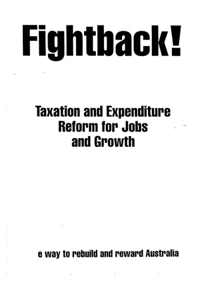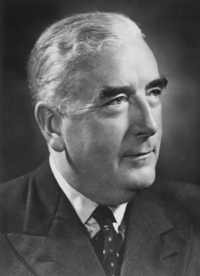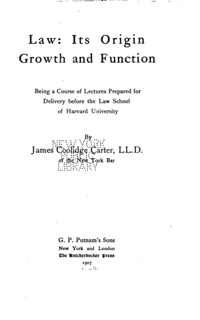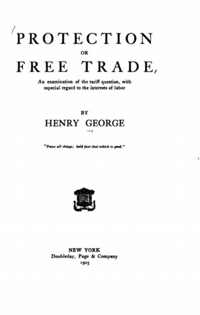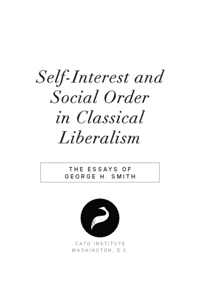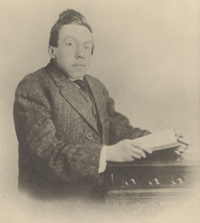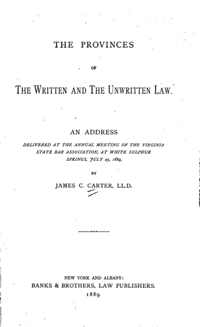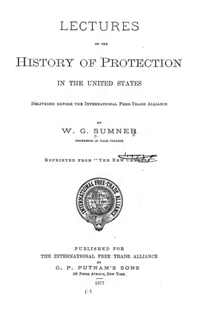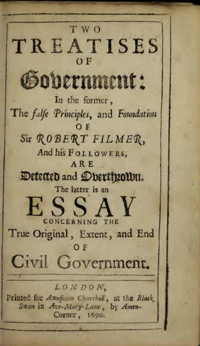
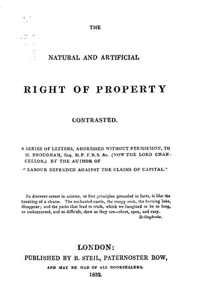
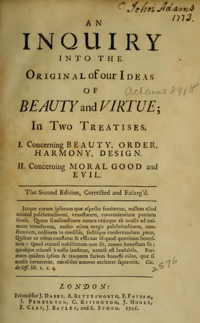
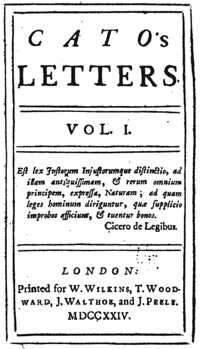
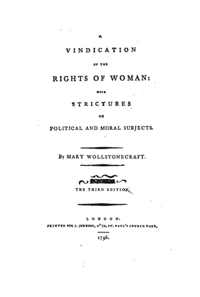
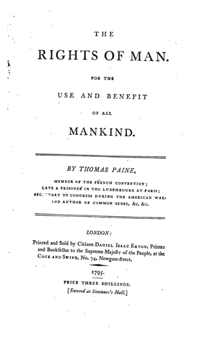
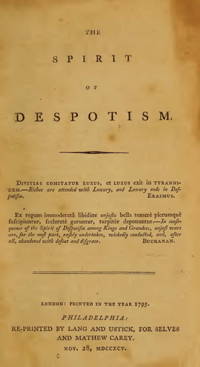
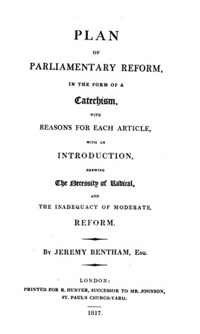
|
Note: I include the "proto-liberal" Levellers of the 1640s in a separate section.
Recent Additions
- One of the truly great books of liberty is John Locke's Two Treatises of Government (1690). I now have the 1st edition of 1690 online [in HTML and facs. PDF] to add to the 1764 Hollis edition which has a beautiful etching of John Locke "the hero of liberty". The Hollis edition was widely circulated in the American colonies on the eve of the Revolution, thus spreading Lockean ideas of property rights, the consent of the governed, and the right to overthrow tyrannical governments.
- I have revised and updated a work I first put online in December 2020: Algernon Sidney (1622-1683), Discourses concerning Government (1698) which now has all of its footnotes, and the margin notes have been reformatted.
- Herbert Spencer, The Principles of Sociology, in Three Volumes (1898 authorized third edition) - vol. 1 [standard HTML, facs. PDF]; vol. 2 [standard HTML, facs. PDF]; vol. 3 [standard HTML, facs. PDF]. See also the combined tables of contents of the three volumes.
- I have combined all three of Spencer's Principles into one very large volume ("3 volumes in 1" at 5.6 MB) in order to facilitate key word searches across the set. Both these works use my new eBook style sheet for better formatting of the text
- for the eBook versions of Spencer's Principles, see:
- I have added the first edition (1798) of Thomas Malthus, An Essay on the Principle of Population, as it affects the future Improvement of Society [HTML and facs. PDF].
- This was an extended response to the more optimistic essays by the radical individualist William Godwin (1756-1836) in his The Enquirer. Reflections On Education, Manners, And Literature (1797) [HTML (to come) and facs. PDF].
- The conversation continued in later enlarged editions of Malthus’s work in 1817 (5th ed.) and 1826 (6th ed.) - the latter in HTML (vol.1 and vol. 2) and facs. PDF (vol.1 and vol. 2), and
- a lengthy reply by Godwin in 1820: Of Population. An Enquiry concerning the Power of Increase in the Numbers of Mankind [HTML and facs. PDF].
- I have revised and reformatted the important work on property rights: Thomas Hodgskin, The Natural and Artificial Right to Property Contrasted (1832) [HTML]. I have added the original page numbers [in square brackets] and placed the footnotes at the end of the file. I have also created an eBook version which is formatted slightly differently. It can be read as an HTML file or a text-based PDF (A4 size page).
- the Scottish moral philosopher and teacher of Adam Smith, Francis Hutcheson (1694–1746), wrote a widely read and influential work on natural rights Inquiry into the Original of Our Ideas of Beauty and Virtue (1725). Note in particular the final section on "alienable" and "unalienable" rights which influenced Thomas Jefferson's thinking on this: “Sect. VII. A Deduction of some complex moral Ideas, viz. of Obligation, and Right, Perfect, Imperfect, and External; Alienable and Unalienable from this moral Sense” in TREATISE II. An Inquiry concerning Mortal Good and Evil. [HTML and facs. PDF].
- the work of the English political and legal theorist Jeremy Bentham (1748-1832) is notoriously hard to read because of his convoluted and pedantic style of writing, but hidden away in the verbiage, sometimes embedded in footnotes to footnotes, are gems of radical liberal insight, as in this neglected piece Plan of Parliamentary Reform: in the form of a Catechism (1817). In typical fashion the "introduction" is longer (at over 330 pages) than the main piece (at 52 pages) but almost lost amongst the jargon are some very insightful observations about how "the ruling few" use the corrupt parliamentary system to rule "the subject many". [HTML and facs. PDF]
- Bentham identified one important way the "ruling few" were able to control the tax-paying "subject-many" and get them to submit to political authority was the use of "political fallacies", by which he meant false, "fallacious", and sophistical arguments. In The Book of Fallacies (1824) [HTML and facs. PDF] he discusses the following kinds of "fallacies" (or in modern terminology "fear, uncertainty, and doubt"):
- fallacies of authority, the subject of which is authority in various shapes, and the object to repress all exercise of the reasoning faculty.
- fallacies of danger, the subject-matter of which is danger in various shapes, and the object to repress discussion altogether, by exciting alarm.
- fallacies of delay, the subject-matter of which is delay in various shapes—and the object, to postpone discussion, with a view of eluding it.
- fallacies of confusion, the object of which is, to perplex, when discussion can no longer be avoided.
- the English theologian and philosopher William Wollaston (1659-1724) wrote a secular (deist) defence of natural rights in The Religion of Nature delineated (1722) which went through many editions in the 18thC. His Lockean theory of property rights is a powerful one much admired by the contemporary libertarian philosopher George Smith. See especially section "VI. Truths Respecting Mankind in General, Antecedent to All Human Laws". [HTML and facs. PDF]
- another radical Whig was the legal theorist and Member of Parliament James Mackintosh (1765–1832)He defended natural rights and the French Revolution which placed him in opposition to the "establishment Whigs" like Edmund Burke.
- Vindiciæ Gallicæ: A Defence of the French Revolution and its English admirers against the accusations of the Right Hon. Edmund Burke (1791) - [facs. PDF of the 1792 ed; HTML from an 1871 ed.]]
- A Discourse on the Study of the Law of Nature and Nations (1799) - [facs. PDF of the 2nd ed. of 1799; HTML from the 1828 ed.]
- several works by the radical Irish Whig and freethinker John Toland (1670-1722) who opposed the corruption within the British Parliament and state (using a theory of "interests" and "partys" which is a form of classical liberal class analysis), the idea of standing armies, and edited the works of some of the leading republicans of the Civil War and Revolution period, such as James Harrington, Algernon Sidney, Edmund Ludlow, and John Milton.
- The Danger of Mercenary Parliaments (1698) [HTML and facs. PDF]
- The Art of Governing by Partys (1701) [HTML and facs. PDF]
- The State-Anatomy of Great Britain. Containing A Particular Account of its several Interests and Parties (1717) [facs. PDF]
- Hypatia (1753) [facs. PDF] - his account of the female Greek philosopher who was murdered by a Christian mob in the city of Alexandria in 415 AD. This was the subject of Alejandro Amenábar's film Agora (2009) nwith Rachel Weisz as Hypatia.
- a collection of essays by "Cato", the pseudonym of two English Commonwealthmen, John Trenchard (1662-1723) and Thomas Gordon (c. 1691–1750), who used the ideas of John Locke to expose the corruption and injustices of the British state in the 1720s and which in turn was avidly read in the North American colonies in the decades prior to the Revolution. Cato's Letters as they were known went through 6 editions. The 144 Letters make up a veritable treatise of political theory and analysis of British institutions. We have online the 6th edition of 1755 in HTML and Facs. PDF [vol. 1 | vol. 2 | vol. 3 | vol. 4 as well as the first edtion of 1723-24.
- after Trenchard died Thomas Gordon turned to using his translations of the Roman historians Sallust (86 – c. 35 BC) and Tacitus (c. AD 56 – c.120) to indirectly criticise the corruption and tyranny of the British government and the Empire. He wrote lengthy "political discourses" as prefaces to his translations which we have comibined into one collection Tyranny, Empire, War, and Corruption: The Political Discourses on Tacitus and Sallust (1728-1744) [HTML]. For the originals see The Works of Sallust (1744) [facs. PDF and HTML] and The Worls of Tacitus (1728, 1737) [facs. PDF and HTML].
- The battle of the "hyphenated liberalisms": in the late 19th century the "radical", individualist, free market liberalism of thinkers like Herbert Spencer (1820-1903) was increasingly replaced by a "new," "social," interventionist form of liberalism espoused by people like Thomas Hill Green (1836-1882) at Oxford University. One could argue that this "new" liberalism was not a form of liberalism at all, but to borrow Hayek's distinction made in another context, "false liberalism." See the following by Green:
- The Principles of Political Obligation (1879-80) [HTML and facs. PDF]
- “On the Different Senses of ‘Freedom’ as Applied to Will and the Moral Progress of Man” (1879) [HTML and facs. PDF]
- "Liberal Legislation and Freedom of Contract” (1881) [HTML and facs. PDF]
- the English radical individualist and advocate of "voluntaryism" Auberon Herbert (1838-1906) presented some of the most eloquent visions of what a free society might look like and the moral reasons for rejecting state compulsion in all its forms, in:
- The Right and Wrong of Compulsion by the State: A Statement of the Moral Principles of the Party of Individual Liberty (1885) [HTML and facs. PDF]
- “The Ethics of Dynamite,” Contemporary Review (May 1894) [HTML and facs, PDF]
- The Principles of Voluntaryism and Free Life (1897) [HTML and facs. PDF]
- The Voluntaryist Creed and A Plea For Voluntaryism (1908) [HTML and facs. PDF]
- Burke's attack on the principles of the French Revolution was quickly responded to by Mary Wollstonecraft (1759-1797) who wrote not one but two "Vindications" - one vindicating the rights of men (1790) [HTML] and the other extending her response to include the rights of women (1792) [HTML].
- A youthful radical indiscretion or an attempt at satire of an opposing view? The 26 year old Edmund Burke (1729-1797) may have made the same mistake as the 20-something Étienne de la Boétie (1530-1563) in his Vindication of Natural Society (1756) in which he, perhaps too cleverly, criticises government or "artificial society" and pushes "logic" to an "unacceptable" extreme (i.e. unacceptable to the ruling elites who might employ him later). We have three editions of this work to help you make up your own mind: 1756, 1757, and 1858 [HTML]. Is this an example of the "battle of the Prefaces"?
- the French Revolution exposed a large rift within the liberal tradition, with conservative "aristocratic" liberals like Edmund Burke (1729-1797) supporting free trade and the American Revolution but not the French Revolution, and radical democratic liberals supporting the violent overthrow of despotic regimes like the French monarchy but not the violent and anti-liberal Jacobin regime. Burke's major writings opposing the French Revolution are Reflections on the Revolution in France (1790) [HTML} and the Letters on a Regicide Peace (1795) [HTML]. Thomas Paine's immediate response to defend the revolution and the ideas of natural rights which justified it was two pamphlets Rights of Man Parts I and II (1791, 1792) [HTML]
- a speech given at Oxford in 1906 and a statement of the "voluntaryist creed" by the English political theorist Auberon Herbert (1838-1906). The latter is one of the most eloquent defences of liberty and the non-aggression principle (“voluntarism”) ever penned. His "creed" can be summarised as the use State force only to protect ourselves against those who would employ force or fraud; and to end every form of compulsory taxation and replace it with “a system of voluntary giving”. The Voluntaryist Creed (1908) in HTML and facs. PDF
- there was a group of four radical English individualists writing in the late 19th century who opposed the increasing power of the state and the rise of socialism, and were members of the Liberty and Property Defence League - Herbert Spencer (1820–1903), Auberon Herbert (1838-1906), Wordsworth Donisthorpe (1847-1914), and Thomas Mackay (1849–1912). They were the British counterpart of the French group of anti-socialist writers whose work we have added recently, namely Paul Leroy-Beaulieu (1843-1916), Yves Guyot (1843-1928), and Gustave de Molinari (1819-1912). The latest addition of the British school is:
- Wordsworth Donisthorpe, Individualism: A System of Politics (1889) in HTML and facs. PDF
- Wordsworth Donisthorpe, Law in a Free State (1895) in HTML and facs. PDF
- two collections of essays edited by Thomas Mackay on behalf of the British "Liberty and Property Defense League" (founded 1882) to combat the rise of socialism, especially the Fabian Socialists:
- A Plea for Liberty: An Argument Against Socialism and Socialistic Legislation (1891) [HTML] and
- A Policy Of Free Exchange: the Economical and Social Aspects (1894) [HTML]
- Australians should note the essays by Charles Fairfield on “State Socialism in the Antipodes” and J.W. Fortescue “State Socialism and the Collapse in Australia” since this new form of socialism was much admired by the British socialists of the day and seen as the path for the future. The pioneers of "state socialism" were Bismarck in the new German Reich after 1871 and the Australian colonies in the last decades of the 19th century
- also in New Zealand: Rossignal and Steward, State socialism in New Zealand (1910) facs. PDF.
- Lord Acton, "Introduction" to Machiavelli's The Prince (1891 ed.) in which he says that Machiavelli accurately describes the amoral and criminal behaviour of traditional leaders as well as the new leaders who were emerging in the nationalist movements in places like Italy and Germany in his own day. Acton describes this as "the emancipation of the State from the moral yoke."
- the important book by L.T. Hobhouse which cemented the transition of "classical" (or radical) liberalism to what was called "new" or "social" liberalism, or what the Americans now call just "liberalism": Liberalism (1911) in HTML and facs. PDF.
- an essay on "Vicesimus Knox (1752-1821): the Friend of Peace and the Foe of Despotism" along with several versions of his long pamphlet "The Spirit of Despotism" (1795), his sermon on "The Prospect of Perpetual and Universal Peace" (August 18 1793), and his introduction to a translation of Erasmus on peace, "Antipolemus; or, the Plea of Reason, Religion, and Humanity, Against War" (1795)
- some of the political writings of the under-appreciated James Mill, father of J.S.:
- Jeremy Bentham on rule by "disinterested experts" or "the fallacy of authority" (1824)
- Herbert Spencer on the State and "Sanitary Supervision" (1851)
|










